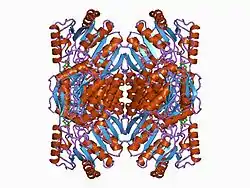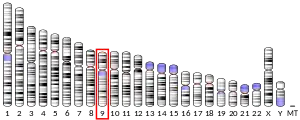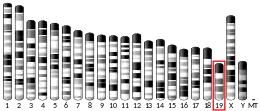ALDH1A1
Aldehyde dehydrogenase 1 family, member A1, also known as ALDH1A1 or retinaldehyde dehydrogenase 1 (RALDH1), is an enzyme that in humans is encoded by the ALDH1A1 gene.[5][6]
Function
This protein belongs to the aldehyde dehydrogenases family of proteins. Aldehyde dehydrogenase is the second enzyme of the major oxidative pathway of alcohol metabolism. Two major liver isoforms of this enzyme, cytosolic and mitochondrial, can be distinguished by their electrophoretic mobilities, kinetic properties, and subcellular localizations; this gene encodes the main cytosolic isoform, which has a lower affinity for aldehydes than the mitochondrial enzyme.[7] Most Caucasians have two major isozymes, while approximately 50% of East Asians have only the cytosolic isozyme, missing the mitochondrial isozyme. A remarkably higher frequency of acute alcohol intoxication among East Asians than among Caucasians could be related to the absence of the mitochondrial isozyme. Furthermore, mutations in this enzyme have been linked to alcoholism in humans.[8][9]
ALDH1A1 also belongs to the group of corneal crystallins that help maintain the transparency of the cornea.[10]
References
- GRCh38: Ensembl release 89: ENSG00000165092 - Ensembl, May 2017
- GRCm38: Ensembl release 89: ENSMUSG00000053279 - Ensembl, May 2017
- "Human PubMed Reference:". National Center for Biotechnology Information, U.S. National Library of Medicine.
- "Mouse PubMed Reference:". National Center for Biotechnology Information, U.S. National Library of Medicine.
- Pereira F, Rosenmann E, Nylen E, Kaufman M, Pinsky L, Wrogemann K (March 1991). "The 56 kDa androgen binding protein is an aldehyde dehydrogenase". Biochemical and Biophysical Research Communications. 175 (3): 831–8. doi:10.1016/0006-291X(91)91640-X. PMID 1709013.
- Hsu LC, Tani K, Fujiyoshi T, Kurachi K, Yoshida A (June 1985). "Cloning of cDNAs for human aldehyde dehydrogenases 1 and 2". Proceedings of the National Academy of Sciences of the United States of America. 82 (11): 3771–5. Bibcode:1985PNAS...82.3771H. doi:10.1073/pnas.82.11.3771. PMC 397869. PMID 2987944.
- "Entrez Gene: ALDH1A1".
- Sherva, Richard; Rice, John P.; Neuman, Rosalind J.; Rochberg, Nanette; Saccone, Nancy L.; Bierut, Laura J. (2009). "Associations and Interactions Between SNPs in the Alcohol Metabolizing Genes and Alcoholism Phenotypes in European Americans". Alcoholism: Clinical and Experimental Research. 33 (5): 848–857. doi:10.1111/j.1530-0277.2009.00904.x. ISSN 1530-0277. PMC 2892966. PMID 19298322.
- Liu, Jixia; Zhou, Zhifeng; Hodgkinson, Colin A.; Yuan, Qiaoping; Shen, Pei-Hong; Mulligan, Connie J.; Wang, Alex; Gray, Rebecca R.; Roy, Alec; Virkkunen, Matti; Goldman, David (2011). "Haplotype-Based Study of the Association of Alcohol-Metabolizing Genes With Alcohol Dependence in Four Independent Populations". Alcoholism: Clinical and Experimental Research. 35 (2): 304–316. doi:10.1111/j.1530-0277.2010.01346.x. ISSN 1530-0277. PMC 3026908. PMID 21083667.
- Jester JV, Moller-Pedersen T, Huang J, Sax CM, Kays WT, Cavangh HD, Petroll WM, Piatigorsky J (March 1999). "The cellular basis of corneal transparency: evidence for 'corneal crystallins'". Journal of Cell Science. 112. 112 ( Pt 5): 613–22. PMID 9973596.
External links
- Human ALDH1A1 genome location and ALDH1A1 gene details page in the UCSC Genome Browser.
Further reading
- Walsh N, Dowling P, O'Donovan N, Henry M, Meleady P, Clynes M (December 2008). "Aldehyde dehydrogenase 1A1 and gelsolin identified as novel invasion-modulating factors in conditioned medium of pancreatic cancer cells" (PDF). Journal of Proteomics. 71 (5): 561–71. doi:10.1016/j.jprot.2008.09.002. PMID 18848913.
- Barley K, Dracheva S, Byne W (July 2009). "Subcortical oligodendrocyte- and astrocyte-associated gene expression in subjects with schizophrenia, major depression and bipolar disorder". Schizophrenia Research. 112 (1–3): 54–64. doi:10.1016/j.schres.2009.04.019. PMID 19447584. S2CID 39003080.
- Ekhart C, Doodeman VD, Rodenhuis S, Smits PH, Beijnen JH, Huitema AD (June 2008). "Influence of polymorphisms of drug metabolizing enzymes (CYP2B6, CYP2C9, CYP2C19, CYP3A4, CYP3A5, GSTA1, GSTP1, ALDH1A1 and ALDH3A1) on the pharmacokinetics of cyclophosphamide and 4-hydroxycyclophosphamide". Pharmacogenetics and Genomics. 18 (6): 515–23. doi:10.1097/FPC.0b013e3282fc9766. PMID 18496131. S2CID 5604777.
- Rodriguez FJ, Giannini C, Asmann YW, Sharma MK, Perry A, Tibbetts KM, Jenkins RB, Scheithauer BW, Anant S, Jenkins S, Eberhart CG, Sarkaria JN, Gutmann DH (December 2008). "Gene expression profiling of NF-1-associated and sporadic pilocytic astrocytoma identifies aldehyde dehydrogenase 1 family member L1 (ALDH1L1) as an underexpressed candidate biomarker in aggressive subtypes". Journal of Neuropathology and Experimental Neurology. 67 (12): 1194–204. doi:10.1097/NEN.0b013e31818fbe1e. PMC 2730602. PMID 19018242.
- Carpentino JE, Hynes MJ, Appelman HD, Zheng T, Steindler DA, Scott EW, Huang EH (October 2009). "Aldehyde dehydrogenase-expressing colon stem cells contribute to tumorigenesis in the transition from colitis to cancer". Cancer Research. 69 (20): 8208–15. doi:10.1158/0008-5472.CAN-09-1132. PMC 2776663. PMID 19808966.
- Ma S, Chan KW, Lee TK, Tang KH, Wo JY, Zheng BJ, Guan XY (July 2008). "Aldehyde dehydrogenase discriminates the CD133 liver cancer stem cell populations". Molecular Cancer Research. 6 (7): 1146–53. doi:10.1158/1541-7786.MCR-08-0035. PMID 18644979.
- Xiao T, Shoeb M, Siddiqui MS, Zhang M, Ramana KV, Srivastava SK, Vasiliou V, Ansari NH (2009). "Molecular cloning and oxidative modification of human lens ALDH1A1: implication in impaired detoxification of lipid aldehydes". Journal of Toxicology and Environmental Health. Part A. 72 (9): 577–84. doi:10.1080/15287390802706371. PMC 5645793. PMID 19296407.
- Cañestro C, Catchen JM, Rodríguez-Marí A, Yokoi H, Postlethwait JH (May 2009). Gojobori T (ed.). "Consequences of lineage-specific gene loss on functional evolution of surviving paralogs: ALDH1A and retinoic acid signaling in vertebrate genomes". PLOS Genetics. 5 (5): e1000496. doi:10.1371/journal.pgen.1000496. PMC 2682703. PMID 19478994.
- Saito A, Kawamoto M, Kamatani N (June 2009). "Association study between single-nucleotide polymorphisms in 199 drug-related genes and commonly measured quantitative traits of 752 healthy Japanese subjects". Journal of Human Genetics. 54 (6): 317–23. doi:10.1038/jhg.2009.31. PMID 19343046.
- Chen YC, Chen YW, Hsu HS, Tseng LM, Huang PI, Lu KH, Chen DT, Tai LK, Yung MC, Chang SC, Ku HH, Chiou SH, Lo WL (July 2009). "Aldehyde dehydrogenase 1 is a putative marker for cancer stem cells in head and neck squamous cancer". Biochemical and Biophysical Research Communications. 385 (3): 307–13. doi:10.1016/j.bbrc.2009.05.048. PMID 19450560.
- Tabakoff B, Saba L, Printz M, Flodman P, Hodgkinson C, Goldman D, Koob G, Richardson HN, Kechris K, Bell RL, Hübner N, Heinig M, Pravenec M, Mangion J, Legault L, Dongier M, Conigrave KM, Whitfield JB, Saunders J, Grant B, Hoffman PL (October 2009). "Genetical genomic determinants of alcohol consumption in rats and humans". BMC Biology. 7: 70. doi:10.1186/1741-7007-7-70. PMC 2777866. PMID 19874574.
- Morimoto K, Kim SJ, Tanei T, Shimazu K, Tanji Y, Taguchi T, Tamaki Y, Terada N, Noguchi S (June 2009). "Stem cell marker aldehyde dehydrogenase 1-positive breast cancers are characterized by negative estrogen receptor, positive human epidermal growth factor receptor type 2, and high Ki67 expression". Cancer Science. 100 (6): 1062–8. doi:10.1111/j.1349-7006.2009.01151.x. PMID 19385968. S2CID 22510108.
- Ekhart C, Rodenhuis S, Smits PH, Beijnen JH, Huitema AD (November 2008). "Relations between polymorphisms in drug-metabolising enzymes and toxicity of chemotherapy with cyclophosphamide, thiotepa and carboplatin". Pharmacogenetics and Genomics. 18 (11): 1009–15. doi:10.1097/FPC.0b013e328313aaa4. PMID 18854779. S2CID 2979088.
- Wan C, Shi Y, Zhao X, Tang W, Zhang M, Ji B, Zhu H, Xu Y, Li H, Feng G, He L (November 2009). "Positive association between ALDH1A2 and schizophrenia in the Chinese population". Progress in Neuro-Psychopharmacology & Biological Psychiatry. 33 (8): 1491–5. doi:10.1016/j.pnpbp.2009.08.008. PMID 19703508. S2CID 32862839.
- Low SK, Kiyotani K, Mushiroda T, Daigo Y, Nakamura Y, Zembutsu H (October 2009). "Association study of genetic polymorphism in ABCC4 with cyclophosphamide-induced adverse drug reactions in breast cancer patients". Journal of Human Genetics. 54 (10): 564–71. doi:10.1038/jhg.2009.79. PMID 19696793.
- Moore SM, Liang T, Graves TJ, McCall KM, Carr LG, Ehlers CL (July 2009). "Identification of a novel cytosolic aldehyde dehydrogenase allele, ALDH1A1*4". Human Genomics. 3 (4): 304–7. doi:10.1186/1479-7364-3-4-304. PMC 2885287. PMID 19706361.
- Chang B, Liu G, Xue F, Rosen DG, Xiao L, Wang X, Liu J (June 2009). "ALDH1 expression correlates with favorable prognosis in ovarian cancers". Modern Pathology. 22 (6): 817–23. doi:10.1038/modpathol.2009.35. PMC 2692456. PMID 19329942.
- Lind PA, Eriksson CJ, Wilhelmsen KC (September 2008). "The role of aldehyde dehydrogenase-1 (ALDH1A1) polymorphisms in harmful alcohol consumption in a Finnish population". Human Genomics. 3 (1): 24–35. doi:10.1186/1479-7364-3-1-24. PMC 3525184. PMID 19129088.
- Moreb JS, Baker HV, Chang LJ, Amaya M, Lopez MC, Ostmark B, Chou W (November 2008). "ALDH isozymes downregulation affects cell growth, cell motility and gene expression in lung cancer cells". Molecular Cancer. 7 (1): 87. doi:10.1186/1476-4598-7-87. PMC 2605459. PMID 19025616.
This article incorporates text from the United States National Library of Medicine, which is in the public domain.





